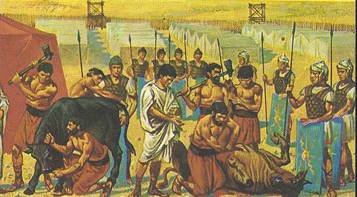“IT is impossible to find peace and quiet in this city!” Seneca, in Nero’s Rome for a visit, was not enjoying his stay and he wrote about it in an angry letter to one of his friends in the country. “The room I have rented is right over‚ a public bath and I might as well have taken a bed in the Tower of Babel. When the athletic bathers do their exercises, I hear every grunt as they strain to lift the dumbbells and the awful wheezes as they drop them again. In the ball court, a loud-mouthed coach calls …
Read More »Tag Archives: Horace
The City of Augustus 29 B. C. – A. D. 14
IN 29 B.C. the gates of war were closed. Rome was at peace. Senators and the people of the mob-men who had hated and fought each other through long, bitter years — stood side by side in the Forum while the great doors of the temple of Janus were slowly pushed shut. That had happened only twice before in the history of the city. The crowd in the Forum cheered the peace and they cheered Octavius, their new ruler. He was no longer the young man who had rushed to Rome after the murder of his uncle, Caesar. Seventeen years …
Read More »
